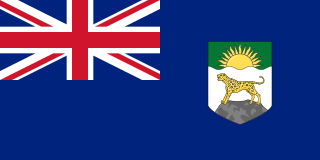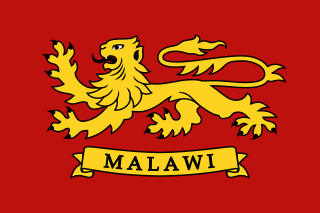Related Research Articles

Malawi, officially the Republic of Malawi and formerly known as Nyasaland, is a landlocked country in Southeastern Africa. It is bordered by Zambia to the west, Tanzania to the north and northeast, and Mozambique to the east, south and southwest. Malawi spans over 118,484 km2 (45,747 sq mi) and has an estimated population of 19,431,566. Malawi's capital and largest city is Lilongwe. Its second-largest is Blantyre, its third-largest is Mzuzu and its fourth-largest is its former capital, Zomba. It was the first capital city of Malawi before being changed to Lilongwe.
The History of Malawi covers the area of present-day Malawi. The region was once part of the Maravi Empire. In colonial times, the territory was ruled by the British, under whose control it was known first as British Central Africa and later Nyasaland. It becomes part of the Federation of Rhodesia and Nyasaland. The country achieved full independence, as Malawi, in 1964. After independence, Malawi was ruled as a one-party state under Hastings Banda until 1994.

Nyasaland was a British protectorate located in Africa that was established in 1907 when the former British Central Africa Protectorate changed its name. Between 1953 and 1963, Nyasaland was part of the Federation of Rhodesia and Nyasaland. After the Federation was dissolved, Nyasaland became independent from Britain on 6 July 1964 and was renamed Malawi.

The flag of Malawi was officially adopted on 6 July 1964 when the colony of Nyasaland became independent from British rule and renamed itself Malawi.

The president of the Republic of Malawi is the head of state and head of government of Malawi. The president leads the executive branch of the Government of Malawi and is the commander-in-chief of the Malawian Defence Force.

The Malawi national football team represents Malawi in association football and is controlled by the Football Association of Malawi. Before 1966, it was known as the Nyasaland national football team.
The pound was the currency of Malawi until 1971. From 1932, Malawi used the Southern Rhodesian pound. In 1955, a new currency was introduced, the Rhodesia and Nyasaland pound. This was replaced by the Malawian pound in 1964, following Malawi's independence. The pound was subdivided into 20 shillings, each of 12 pence. The pound was replaced by the decimal kwacha in 1971, at a rate of 2 kwacha = 1 pound.
The Church of the Province of Central Africa is part of the Anglican Communion, and includes 15 dioceses in Botswana, Malawi, Zambia and Zimbabwe. The Primate of the Church is the Archbishop of Central Africa. Albert Chama is the current archbishop, being installed on 20 March 2011, succeeding Bernard Amos Malango who retired in 2007. From 1980 to 2000, Walter Khotso Makhulu, a noted Anti-Apartheid activist, was Archbishop as well as Bishop of Botswana. Archbishop Chama continues to serve as Bishop of Northern Zambia, and is the second Zambian to be Archbishop of Central Africa.

Malawi have participated in twelve Commonwealth Games, attending every one from 1970 onwards. They have won only three medals, all bronze and all in boxing.

The Federation of Rhodesia and Nyasaland, also known as the Central African Federation (CAF), was a colonial federation that consisted of three southern African territories: the self-governing British colony of Southern Rhodesia and the British protectorates of Northern Rhodesia and Nyasaland. It existed between 1953 and 1963.

The Nyasaland national rugby union team formerly represented Nyasaland, now Malawi, in the sport of rugby union.

This is a survey of the postage stamps and postal history of Malawi.

On 6 July 1907 the British Central Africa Protectorate became the Nyasaland Protectorate and its first stamps were issued on 22 July 1908.

Malawi and the United Kingdom have formal diplomatic relations. They are both Commonwealth countries.

Elizabeth II was Queen of Malawi from 1964 to 1966, when Malawi was an independent sovereign state and a constitutional monarchy within the Commonwealth of Nations. She was also the sovereign of the other Commonwealth realms, including the United Kingdom. The 1964 Constitution of Malawi vested executive power in the monarch as head of state, though her constitutional roles were delegated to her representative, the Governor-General, Sir Glyn Smallwood Jones, who was also the last Governor of Nyasaland.

The Monckton Commission, officially the Advisory Commission for the Review of the Constitution of the Federation of Rhodesia and Nyasaland, was set up by the British government under the chairmanship of Walter Monckton, 1st Viscount Monckton of Brenchley, in 1960. Its purpose was to investigate and make proposals for the future of the Federation of Rhodesia and Nyasaland, made up of Southern Rhodesia, Northern Rhodesia and Nyasaland—respectively equivalent to today's Zimbabwe, Zambia and Malawi.

The Nyasaland Constitutional Party (NCP) was a political party in Malawi.
Michael Hill Blackwood CBE was a lawyer and politician who spent most of his working life in colonial Nyasaland and in Malawi in the early years of its independence. Although he represented the interests of European settlers before independence and opposed both the transfer of power to the African majority and the break-up of the Federation of Rhodesia and Nyasaland, he remained in the country as a member of its legislature after Malawi’s independence and until his retirement on 1983.

The history of the Jews in Malawi formerly known as Nyasaland, and part of the former Federation of Rhodesia and Nyasaland.

Malawi–Turkey relations are foreign relations between Malawi and Turkey. The Turkish ambassador in Lusaka, Zambia is also accredited to Malawi. Malawi is accredited to Turkey from its embassy in Berlin, Germany. Turkey has plans to open an embassy in Lilongwe.
References
- ↑ "No. 27396". The London Gazette . 10 January 1902. p. 219.
